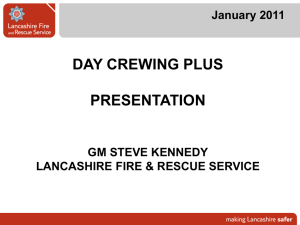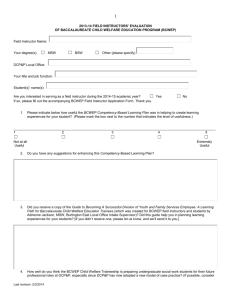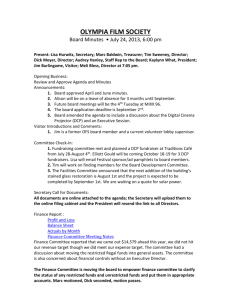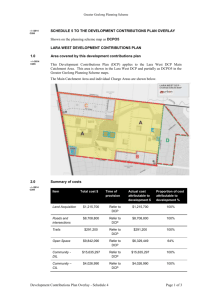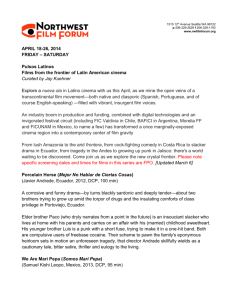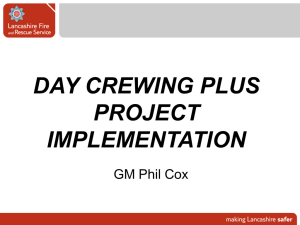New World Poetics Engl 258/Amst 269 Spring 2016 MW
advertisement
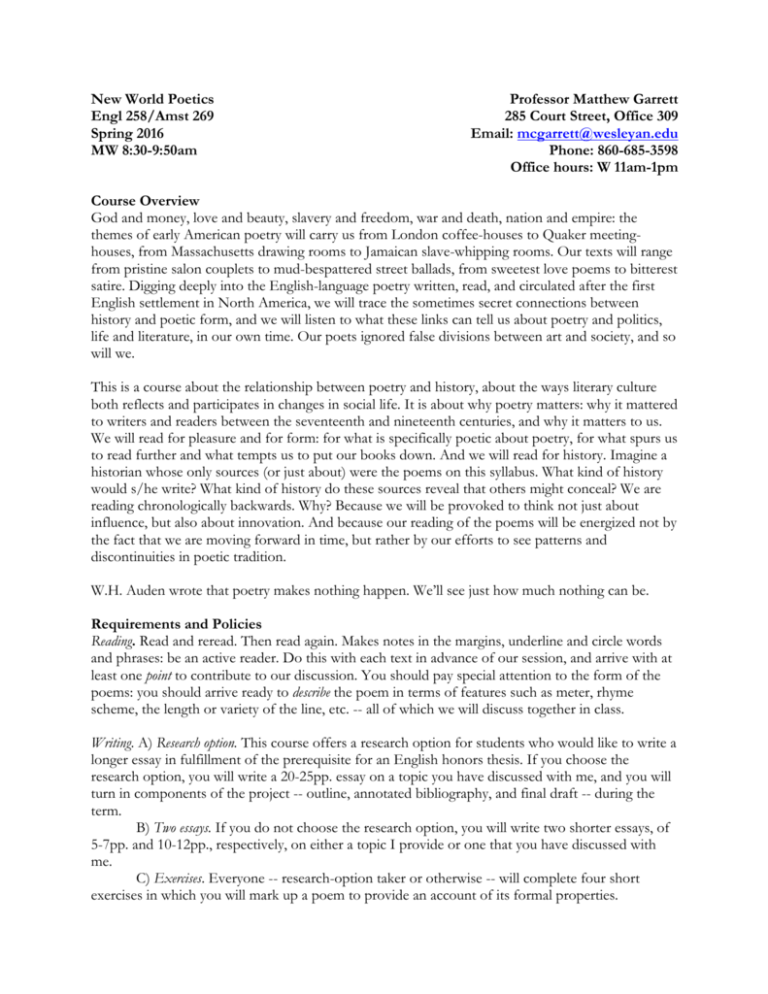
New World Poetics Engl 258/Amst 269 Spring 2016 MW 8:30-9:50am Professor Matthew Garrett 285 Court Street, Office 309 Email: mcgarrett@wesleyan.edu Phone: 860-685-3598 Office hours: W 11am-1pm Course Overview God and money, love and beauty, slavery and freedom, war and death, nation and empire: the themes of early American poetry will carry us from London coffee-houses to Quaker meetinghouses, from Massachusetts drawing rooms to Jamaican slave-whipping rooms. Our texts will range from pristine salon couplets to mud-bespattered street ballads, from sweetest love poems to bitterest satire. Digging deeply into the English-language poetry written, read, and circulated after the first English settlement in North America, we will trace the sometimes secret connections between history and poetic form, and we will listen to what these links can tell us about poetry and politics, life and literature, in our own time. Our poets ignored false divisions between art and society, and so will we. This is a course about the relationship between poetry and history, about the ways literary culture both reflects and participates in changes in social life. It is about why poetry matters: why it mattered to writers and readers between the seventeenth and nineteenth centuries, and why it matters to us. We will read for pleasure and for form: for what is specifically poetic about poetry, for what spurs us to read further and what tempts us to put our books down. And we will read for history. Imagine a historian whose only sources (or just about) were the poems on this syllabus. What kind of history would s/he write? What kind of history do these sources reveal that others might conceal? We are reading chronologically backwards. Why? Because we will be provoked to think not just about influence, but also about innovation. And because our reading of the poems will be energized not by the fact that we are moving forward in time, but rather by our efforts to see patterns and discontinuities in poetic tradition. W.H. Auden wrote that poetry makes nothing happen. We’ll see just how much nothing can be. Requirements and Policies Reading. Read and reread. Then read again. Makes notes in the margins, underline and circle words and phrases: be an active reader. Do this with each text in advance of our session, and arrive with at least one point to contribute to our discussion. You should pay special attention to the form of the poems: you should arrive ready to describe the poem in terms of features such as meter, rhyme scheme, the length or variety of the line, etc. -- all of which we will discuss together in class. Writing. A) Research option. This course offers a research option for students who would like to write a longer essay in fulfillment of the prerequisite for an English honors thesis. If you choose the research option, you will write a 20-25pp. essay on a topic you have discussed with me, and you will turn in components of the project -- outline, annotated bibliography, and final draft -- during the term. B) Two essays. If you do not choose the research option, you will write two shorter essays, of 5-7pp. and 10-12pp., respectively, on either a topic I provide or one that you have discussed with me. C) Exercises. Everyone -- research-option taker or otherwise -- will complete four short exercises in which you will mark up a poem to provide an account of its formal properties. Engl 258/Amst 269 – Spring 2016 2 Archival presentations. Each member of the seminar will pair up with another to give a 10- to 15minute presentation (with a write-up you will turn in) on a text that the two of you have located in one of the online archival databases accessible through the Wesleyan Library. Participation. This course is a seminar: we succeed or fail collectively. You should arrive at each of our sessions ready to talk and ready to listen with engagement and generosity to your fellow students. If a text excites you, talk about it. If something confuses you, ask questions. If you agree with comments someone makes, try to elaborate your agreement with the class. If a text bores you, ask yourself why and then talk about your response. If you disagree with someone, explain why. In short, move your mouth -- in ways that contribute to our common enterprise in the seminar. Attendance, deadlines. More than three absences will be grounds for failing the course. All due dates are firm: extensions will be granted only in cases of serious illness or personal crisis. Don’t even ask. Grades Your final grade breaks down like this: 60%: Two essays (5-7pp., 20%; 10-12pp., 40%) or research essay 20%: Participation 10%: Archival presentation, including write-up 10%: Written exercises Disabilities resources. Wesleyan University is committed to ensuring that all qualified students with disabilities are afforded an equal opportunity to participate in and benefit from its programs and services. To receive accommodations, a student must have a documented disability as defined by Section 504 of the Rehabilitation Act of 1973 and the ADA Amendments Act of 2008, and provide documentation of the disability. Since accommodations may require early planning and generally are not provided retroactively, please contact Disability Resources as soon as possible. If you believe that you need accommodations for a disability, please contact Dean Patey (lpatey@wesleyan.edu) in Disability Resources located in North College, room 021, or call 860-6855581 for an appointment to discuss your needs and the process for requesting accommodations. Honor Code. Please write an abbreviated form of the Honor Code pledge (“No aid, no violation.”) at the top of the first page of all assignments. All work must be done in compliance with the Honor Code. If you need help with proper citations or you have any questions at all on how to avoid plagiarism, please talk with me. TEXTS (available at Broad Street Books) Emily Dickinson, The Complete Poems of Emily Dickinson (Back Bay Books) - DCP John Gilmore, The Poetics of Empire: A Study of James Grainger’s The Sugar-Cane (Athlone; also available electronically through Olin Library) - PE Henry Wadsworth Longfellow, Selected Poems (Penguin) - LSP John Milton, The Major Works (Oxford UP) - JM David S. Shields, ed. American Poetry: The Seventeenth and Eighteenth Centuries (Library of America) - AP Phillis Wheatley, Complete Writings (Penguin) - WCW Walt Whitman, Leaves of Grass and Other Writings (W.W. Norton) - LG Engl 258/Amst 269 – Spring 2016 3 SCHEDULE (texts followed by an asterisk [*] will be posted to the course Moodle site) Monday, 1/25 – Introduction: Poetry and History Wednesday, 1/27 – Whitman: Appetite, Pleasure, Heroism 1 Leaves of Grass (1855 ed., LG 662-751), 1855 Preface (616-36) Monday, 2/1 – Whitman: Appetite, Pleasure, Heroism 2 “Children of Adam” (LG 78-96), “Calamus” (LG 96-116), “Salut au Monde!” (117-126), “Song of the Open Road” (126-135), “Crossing Brooklyn Ferry” (135-140), “Song of the Answerer” (141-144), “Our Old Feuillage” (145-149), “A Song of Joys” (149-155), “Song of the BroadAxe” (155-164), “Song of the Exposition” (165-173), “Song of the Redwood-Tree” (173-177), “A Song for Occupations” (177-183), “A Song of the Rolling Earth” (184-189), “Youth, Day, Old Age and Night” (189) Whitman’s comments on his poems (783-788) Wednesday, 2/3 – Dickinson: Soul and Form 1 Read around and arrive with your favorites for discussion. Please also read the following: “There is a word” (DCP 9), “Our lives are Swiss” (DCP 41), “I’ve heard an Organ talk, sometimes” (DCP 87), “I’m ‘wife’ – I’ve finished that” (DCP 94), “I stole them from a Bee” (DCP 94), “Least Rivers – docile to some sea” (DCP 98), “I like a look of Agony” (DCP 110), “Wild Nights – Wild Nights!” (DCP 114), “ ‘Hope’ is the thing with feathers” (DCP 116), “Read – Sweet – how others – strove” (DCP 119), “I felt a Funeral, in my Brain” (DCP 128), “I’m Nobody! Who are you?” (DCP 133), “The difference between Despair” (DCP 144), “He fumbles at your Soul” (DCP 148), “We grow accustomed to the Dark” (DCP 200), “Knows how to forget!” (DCP 207208) Paul Fussell, from Poetic Meter and Poetic Form* Monday, 2/8 -- Dickinson: Soul and Form 2 As for 2/3, read around and arrive with your favorites for discussion. We will continue where we left off, but you should also read the following: “Much Madness is divinest Sense” (DCP 209), “Going to Him! Happy letter!” and “Going – to – Her!” (DCP 237-239), “This World is not Conclusion” (DCP 243), “To fill a Gap” (DCP 266), “The Brain, within its Groove” (DCP 270-271), “They shut me up in Prose” (DCP 302), “The Way I read a Letter’s – this” (DCP 314-315), “Pain – has an Element of Blank” (DCP 323), “I dwell in Possibility” (DCP 327), “Wolfe demanded during dying” (DCP 336), “They say that ‘Time assuages’” (DCP 339), “Publication – is the Auction” (DCP 348) “No Prisoner be” (DCP 353), “Defrauded I a Butterfly” (DCP 358), “It dropped so low – in my Regard” (DCP 366), “From Blank to Blank” (DCP 373), “They have a little Odor – that to me” (DCP 382), “Split the Lark – and you’ll find the Music” (DCP 412) First exercise due in class Wednesday, 2/10 – Dickinson: Soul and Form 3 “Crisis is a Hair” (DCP 421), “Faith – is the Pierless Bridge” (DCP 431), “Patience – has a quiet Outer” (DCP 435), “The Chemical conviction” (DCP 446-447), “We meet as Sparks – Diverging Flints” (DCP 448), “There is a Zone whose even Years” (DCP 481), “Perception of an object Engl 258/Amst 269 – Spring 2016 4 costs” (DCP 486-487), “Revolution is the Pod” (DCP 490-491), “I am afraid to own a Body” (DCP 493-494), “Tell all the Truth but tell it slant” (DCP 506-507), “Our own possessions – though our own” (DCP 533), “A word is dead” (DCP 534-535), “There is no Frigate like a Book” (DCP 553), “The competitions of the sky” (DCP 629), “All things swept sole away” (DCP 635), “Witchcraft was hung, in History” (DCP 656), “There are two Mays” (DCP 666), “Oh Future! thou secreted place” (DCP 670), “A Word made Flesh is seldom” (DCP 675-676), “The mob within the heart” (DCP 707) Monday, 2/15 – Longfellow: History/Poetry as Commodity 1 Evangeline, Part First (LSP) Wednesday, 2/17 – Longfellow: History/Poetry as Commodity 2 Evangeline, Part Second (LSP) Second exercise due in class Monday, 2/22 – Slavery and the Circulation of Poems 1 Hannah More, “The Black Slave Trade,” “The Sorrows of Yamba,” “The Feast of Freedom;” selections of children’s anti-slavery verse * Wednesday, 2/24 – Slavery and the Circulation of Poems 2 Elizabeth Barrett Browning, “The Runaway Slave at Pilgrim’s Point”*; blackface minstrel songs* Monday, 2/29 – Wednesday, 2/24 – Dawn or Yawn of America 1 “Yankee Doodle” (AP 616-620); Hannah Griffitts, all selections (AP 558-63); Joel Barlow, “The Hasty-Pudding” (AP 799-808); Royall Tyler, “The Origin of Evil: An Elegy” (AP 809-12) Wednesday, 3/2 – Dawn or Yawn of America 2 William Blake, “America”* Friday, 3/4: Printed copy of first essay (5-7pp.) due in box outside my office by noon. Midsemester recess Monday, 3/21 – Wheatley: Imagination, Imitation, and Slavery 1 Alexander Pope, from An Essay on Man; Wheatley, selections (WCW) Wednesday, 3/23 – Wheatley: Imagination, Imitation, and Slavery 2 Wheatley, selections (WCW); Jupiter Hammon, “An Address to Miss Phillis Wheatley” (AP 47780) Monday, 3/28 – Some Uses of Verse in the Eighteenth Century Ebenezer Cook, “The Sot-Weed Factor” (AP 239-258) Wednesday, 3/30 – Some Uses of Verse in the Eighteenth Century 2 “Poor Julleyoun’s Warnings to Children and Servants” and “Advice to the Dead from the Living” (AP 470-76); Thomas Clemson, runaway-servant ad (AP 526-27) Engl 258/Amst 269 – Spring 2016 Monday, 4/4 – Empire and the Poetry of the Plantation 1 Introduction (PE 1-85), The Sugar-Cane Preface and Book I, with notes (PE 89-109, 165-182, 213-244) Wednesday, 4/6 – Empire and the Poetry of the Plantation 2 The Sugar-Cane Book II, with notes (PE 111-126, 182-188, 244-264) Monday, 4/11 – Empire and the Poetry of the Plantation 3 The Sugar-Cane Book III, with notes (PE 127-144, 188-192, 264-286) Wednesday, 4/13 – Empire and the Poetry of the Plantation 4 The Sugar-Cane Book IV, with notes (PE 145-63, 193-198, 286-311) George Berkeley, “Verses on the Prospect of Planting Arts and Learning in America” (AP 346) Third exercise due in class. Monday, 4/18 – Puritan Poetics 1 Edward Taylor, from Preparatory Meditations (First Series) (AP 164-178) Relevant scriptural passages Wednesday, 4/20 – Puritan Poetics 2 Edward Taylor, from Preparatory Meditations (Second Series) (AP 178-191) New England Primer (AP 221-23) Relevant scriptural passages* Monday, 4/25 – Milton 1 Paradise Lost Books I (“The Verse, “The Argument, and ll. 1-49) and III (JM 355-57, 401-20) Wednesday, 4/27 – Milton 2 Paradise Lost Book IV (JM 420-45) Monday, 5/2 - Milton 3 Paradise Lost Book IX (JM 523-52) Wednesday, 5/4 – Milton 4 Paradise Lost Books XI and XII (JM 580-618) Fourth exercise due in class. Friday, 5/13 – Printed final essays due by 5pm in box outside my office door. 5
